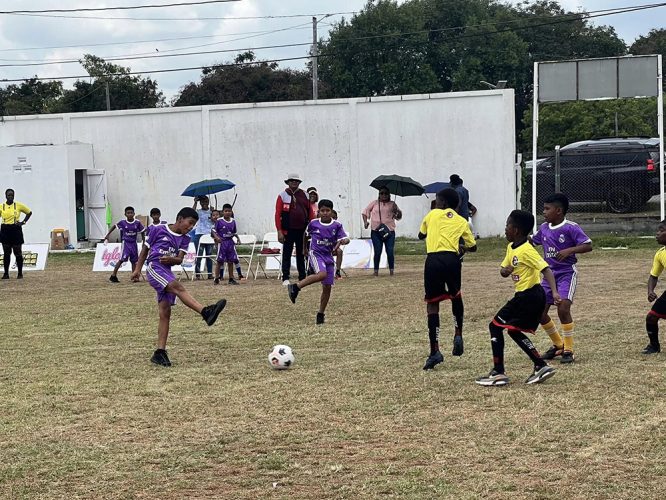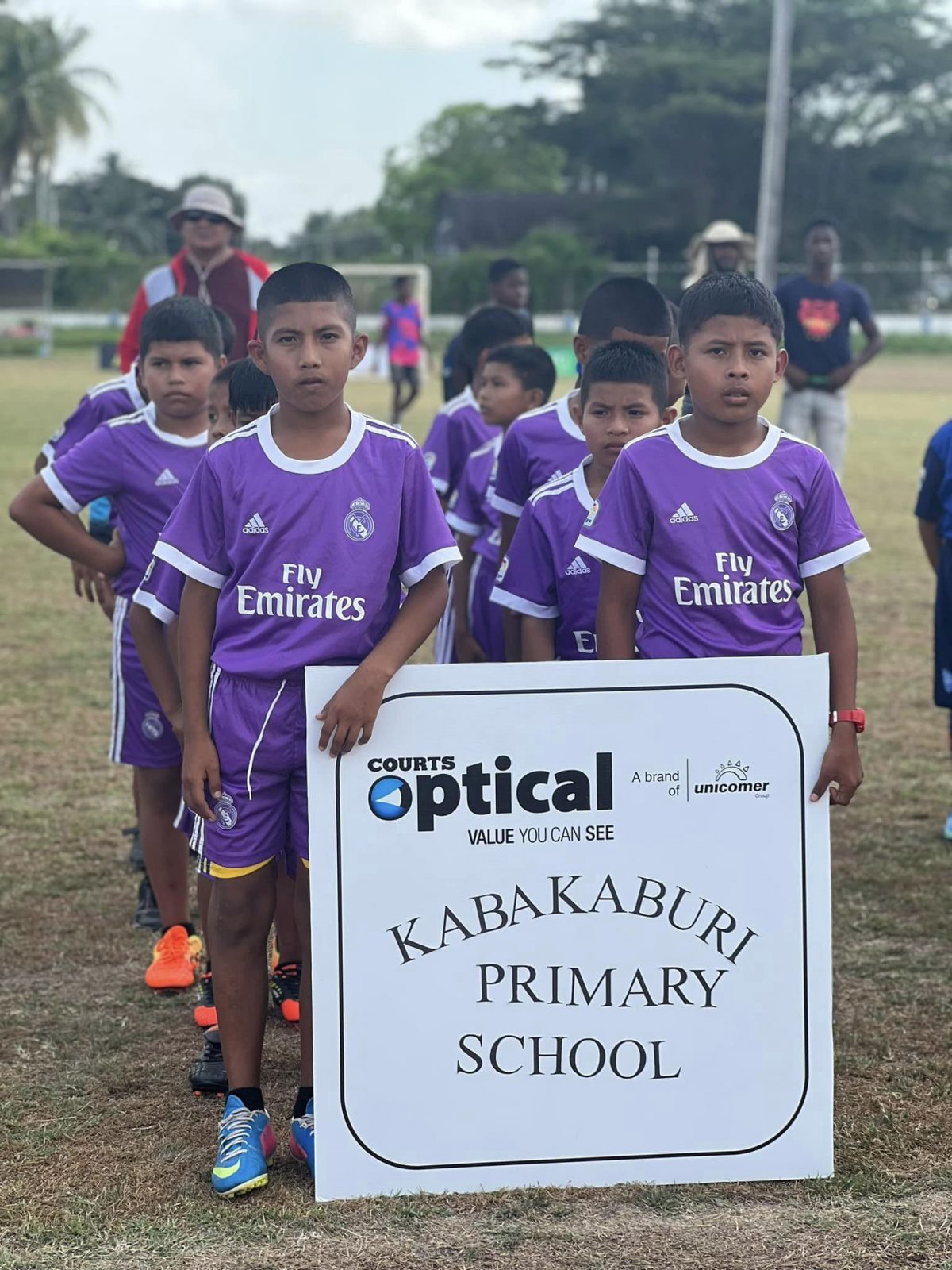By Michelangelo Jacobus
Nestled 16 miles up the Pomeroon River, Kabakaburi is a small Amerindian village that has continually churned out remarkable people.
Doctors, engineers, teachers, broadcasters—you name them. Kabakaburi, home to the Arawak tribe, has a knack for producing people who defy the odds to excel. Historically, the primary school, despite its small numbers, has always done well at sports, be it cricket, football, athletics, or swimming, and is known for producing athletes at that level.
Participating in their first Courts Optical Pee Wee tournament, Kabakaburi have acquitted themselves creditably and have moved from the group stage of the tournament to the round of 16, which they will play tomorrow.
They have won two of their three group stage games, the first thrashing Soesdyke Primary 4-0 before losing the other to a strong St. John the Baptist Primary School (Region 7) side. In the third match, they won by virtue of a walkover, a welcome gift of free points. Their trip to the capital city to play on Saturday mornings is by itself an imposing challenge.

Soesdyke Primary 4-0 in their first match.
The 50-mile trip begins at 1 p.m. on Friday afternoons, when most other participating schools are still in their classrooms. A boat ride from the village takes the 14 boys and two teachers to Charity, the midpoint of the Pomeroon River and the beginning of the Essequibo Coast. At Charity, the boys, along with their teachers, have to spend the night at the dormitory of the community’s secondary school. A less than comfortable stay away from home
They spend most of Friday night there, but at a time when children should be fast asleep, at 2 a.m., they awaken and prepare for the most arduous part of their journey. A bus picks them up and travels along the coast to Supenaam, where they then board the 5 a.m. ferry to cross the Essequibo River to Parika.
Upon arrival at Parika, another bus ride takes them to the Ministry of Education ground on Carifesta Avenue in Georgetown, where they usually arrive at 9 a.m., and by 10:30 a.m., they take the field in the blistering sun to play their hearts out.
The trip sounds straightforward, but in reality, there are a number of challenges. According to Kabakaburi’s coach, Oswald Williams, a sixth grade teacher at the school, many of the boys are unaccustomed to rigorous traveling and are often affected by motion sickness. That, coupled with the odd hours of eating meals due to traveling, leaves his charges drained by the time they take the field.

coach at Kabakaburi Primary School
Despite that, Williams pointed out that his side is not deterred but determined to give their best on the field. Reflecting on the group stage of the tournament, he stated, “It was something that we were looking forward to; I know they would have done well.” We lost the second game because most of our players were sick. They’re determined, but the group stage went well all things considered”.
Ahead of the knockout stage of the competition, Williams said that they have put things in place for the team to have something close to a normal breakfast, as they have arranged for someone at Supenaam to provide breakfast at 5 a.m. He is hoping that the little changes can positively impact his side. This is the first instance that Petra Organization, responsible for the birth of the Pee Wee Schools tournament, has invited teams from as far as Region 2, and it bodes well for the exposure of the hinterland schools such as Kabakaburi. To this end, Williams opined, “The boys have now seen the type of challenge that the coastland schools are putting forward to them. They told me that they would have to play harder in the next stage of the tournament.”
Kabakaburi Primary usually plays against neighboring villages in the Pomeroon, but the Pee Wee tournament presents a vastly different challenge. “Because we are at this competition, they are seeing the level of football being played, and they are actually looking forward to the challenge.”
Quizzed on some of the areas that the hinterland schools need support in, Williams noted that the most important area in which help is needed is the technical aspect of the game. “We definitely need qualified personnel to conduct training sessions with coaches here in Pomeroon. In Georgetown, the various teams would be in sessions with qualified coaches on a daily basis, but here, myself and another teacher try to pass on what little we know of the game to these kids, but that is not enough. Proper coaching is something that can be passed on; knowledge is valuable, and once we have that knowledge, we would be able to better help the children, and in turn, we would see the dividends.”
That aside, a few of the team members do not own football boots, and their goalie is at a disadvantage due to the lack of gloves. That, however, does not dampen their spirits, and the side is ready to give it their best on the field.
Kabakaburi, who will begin their long journey today, will face Redeemer Primary School (Campbellville) in a round of 16 clash tomorrow at 11 a.m. at the Ministry of Education Ground on Carifesta Avenue. Against all odds, the little village school from Pomeroon will be pushing for progression to the next round.






